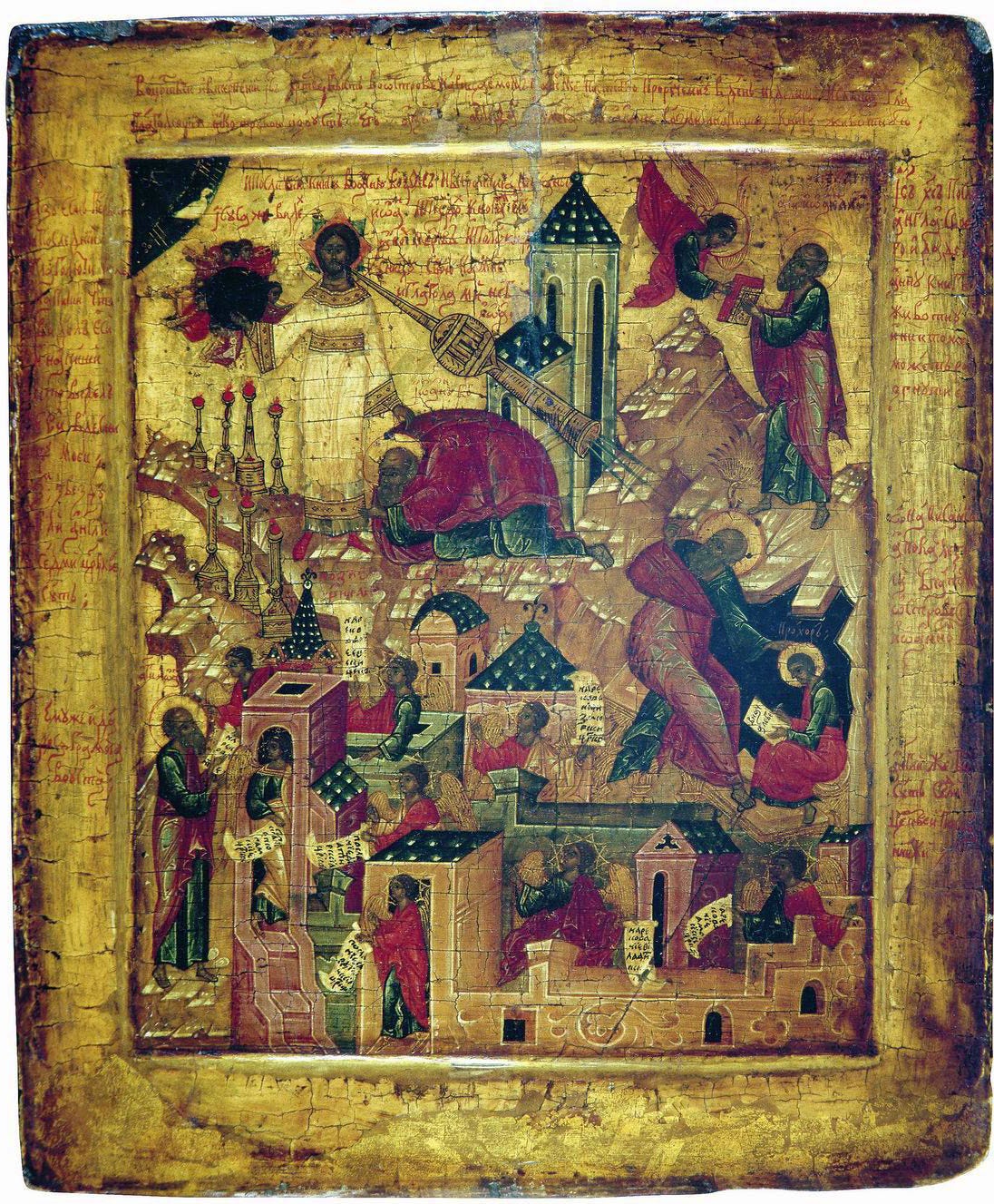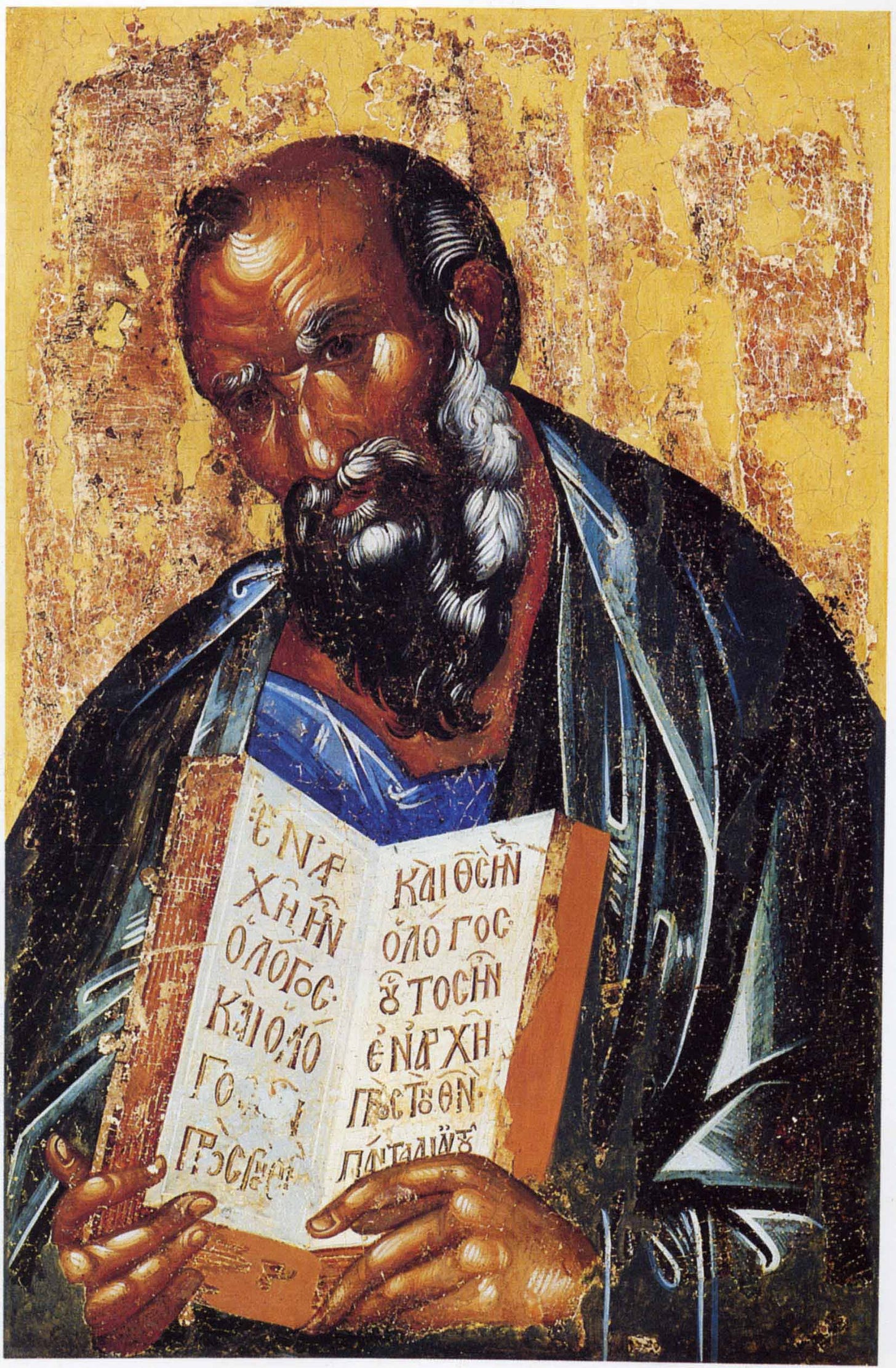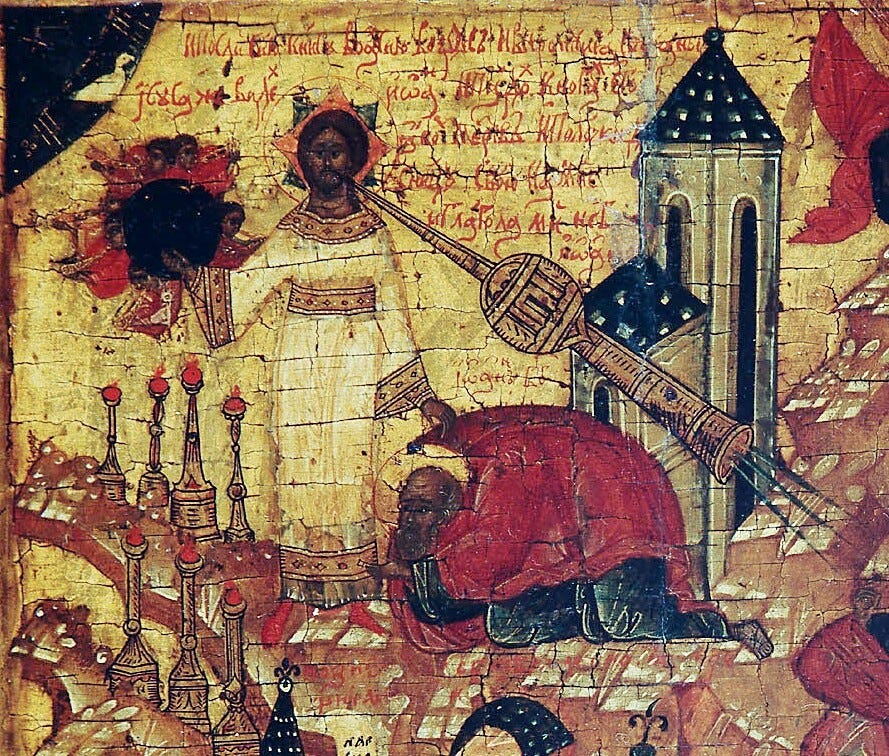Love in Christ as Fuel for Life
sermon reflection on revelation 2:1-7
Today Pastor Jeremy delivered his sermon on Revelation 2:1-7.
Artwork: Russian Orthodox icon depicting Apocalypse, (which means an unveiling or a revealing), in which St. John receives the vision that became the Book of Revelation. 16 century. Artist unknown. Note: the revelation actually refers to a revelation given to Jesus by G-d, the revelation by Jesus to John exists as secondary. Revelation 1:1 tells us this :: “The Revelation of Jesus Christ, which God gave unto him, to show unto his servants things which must shortly come to pass; and he sent and revealed it by his angel unto his servant John.”
Revelation 2:1-7 :: 1Unto the angel of the church of Ephesus write; These things says he that holds the seven stars in his right hand, who walks in the midst of the seven golden lamp-stands; 2I know your works, and your labor, and your patience, and how you can not bear them who are evil: and you have tried them who say they are apostles, and are not, and have found them liars: 3And have endured, and have patience, and for my name’s sake have labored, and have not fainted. 4Nevertheless I have somewhat against you, because you have left your first love. 5Remember therefore from where you are fallen, and repent, and do the first works; or else I will come unto you quickly, and will remove your lampstand out of its place, except you repent. 6But this you have, that you hate the deeds of the Nicolaitans, which I also hate. 7He that has an ear, let him hear what the Spirit says unto the churches; To him that overcomes will I give to eat of the tree of life, which is in the midst of the paradise of God.
Pastor Jeremy opens his sermon with a story about the gas tank in his car going empty many years ago, he never noticed because he got so caught up in doing the things that he forgot to take the time to check the fuel gauge. As Christians we need to fill ourselves regularly with the Holy Spirit. When we focus solely on what we can do for G-d, we forget to pause and reflect on what G-d can do for us. That’s a key theme in today’s passage.
Today’s passage describes the message from Jesus to the Church of Ephesus, as recorded by John.
First of all, we need some background information.
What’s the background on Ephesus? Located in present day Turkey, the Greek city had an important role as a major metropolis in the Roman Empire. It had a diverse and metropolitan profile. The nearby Temple of Artemis dominated the city, influencing the culture and promoting idolatry. The cult of Artemis had an intrinsic connection to the cultural identity of Ephesus. It gave permission to the people to do immoral things, pulling them away from godly endeavours and values. Imagine the progressive wokerati culture of today as a comparative. Paul’s rejection of the cult of Artemis created a backlash and triggered a riot, as described in Acts 19:21-41.
What’s the background on the Nicolaitanes? Nicolaitane refers to a sect of Christianity which sought to introduce false doctrines into Christianity, including permission to participate in pagan rituals, and engage in sexual immorality.
Artwork: John the Theologian, 14th century, artist unknown, Ecclesiastical Byzantine Museum of Mytilene
Jesus commends the people of Ephesus for: hard work, perseverance, discernment.
Let’s think about our present day culture and the ways it draws us away from the Jesus Way, like the cult of Artemis or the Nicolaitans. Technology—specifically the internet and smart phones—harms us psychologically and spiritually. It erodes our resilience and patience. Our cultural value of overemphasising comfort and convenience deprives us of opportunities to engage in spiritual formation. Trials and struggles serve to give us grit, to draw us closer to G-d, to build our endurance.
Pastor Jeremy quotes Ignatius of Antioch, who wrote in his Epistle to the Ephesians, (in which he stresses the importance of keeping focussed on Jesus): “...praiseth your orderly conduct in God, for that ye all live according to the truth and that no heresy hath a home among you; nay, ye do not so much as listen to any one, if speak of aught else save concerning Jesus Christ in truth.”
Being present with Jesus > being busy for Him. When we go through the motions and forget to be present with Jesus and walk His way, we falter, we stray from Jesus. Pastor Jeremy reminds us of the story of Martha and Mary. Like Martha, we can grow cold in our bid to do the things. Remember Love. Being busy can be a badge of honour, we forget Jesus. Contrast the two approaches to living daily life: Focus on we do for Gd versus what focus on Gd can do for us.
Regarding the mention of the Nicolaitins, Pastor Jeremy reminds us that we can hate the bad things people do, without hating the people doing the bad things. Hating the sin and loving the sinner—following the Jesus Way means we must love our enemy, we must love those who do wrong. Jesus offers a 3 part solution: remember (remember your first love and works) repent (turning away from coldness, making changes, return to their first love and works) repeat. As noted in the Patristic commentary, the tree of life refers to Christ.
Early this morning I watched an interview with Fr. John Behr; lately I’ve felt drawn to his teachings, which you can find on YouTube. I find Behr’s theological teaching exquisite. In keeping with St. Athanasius, Behr teaches that, through the cross, Christ unites all. Through His Love, Christ unites all. Remember the quote from John 12:32? I shall draw all men to myself. There’s no before or after for G-d. In G-d all things are present. Adam was a type of The One to Come. Jesus pre-existed Adam, He’s the archetype, and Adam = type of the One to come. In 1 Corinthians 15:45, Paul writes about the movement from breath to spirit, this refers to the movement from Adam to Jesus.
In the light of Christ, death is the enemy and also the victory. With the introduction of the law we became fearful of sin and death. Adam grabbed from the tree, Christ submitted to the tree. One could make an argument for Christ as the tree of life. The fall of man isn’t a static event that happened in the past. Rather it’s the way we relate to life and the life, death, resurrection of Christ. So, Love means giving of ourselves, it means doing that through and with Christ—that’s the fuel for our daily existence. Behr contrasts Genesis (come into being) versus Gennesis (to be born). Birth = come into life. In this light, death becomes birth, a birth from above.
What’s the road to Love? It’s dying to self.
I’ll leave readers with a quote from scholar, theologian, and professor Fr. John Behr, that sums up what Love through and in Christ means.
“As Christ shows us what it is to be G-d by the way he dies as a human being, we in turn are the ones who must give the “fiat” to the only work said to be G-d’s own project, in this way ourselves becoming human beings in the stature of Christ. The four dimensions of apocalypse, above and below, the beginning and the end, are thus brought together by John in the figure of the cross.” — John Behr
Cross or Sword? Choose one. You cannot have both. Remember our salvation exists in mercy not merit. So, being with Jesus means far more to our spiritual wellbeing than does doing for Jesus. When we place doing above being, we become like Martha, our actions become our idols, as we craft for ourselves a badge of merit.
Remember who you are.
Alternatively, you can support this endeavour via Buy Me A Coffee.






O'Lord Jesus Christ Son of God have mercy on us and save us....